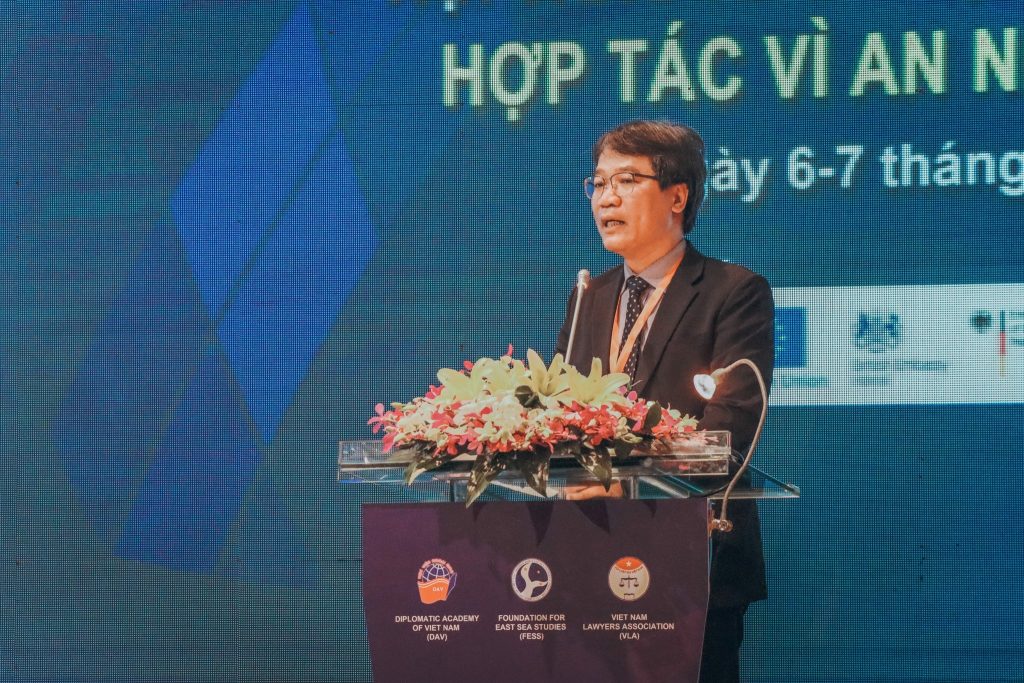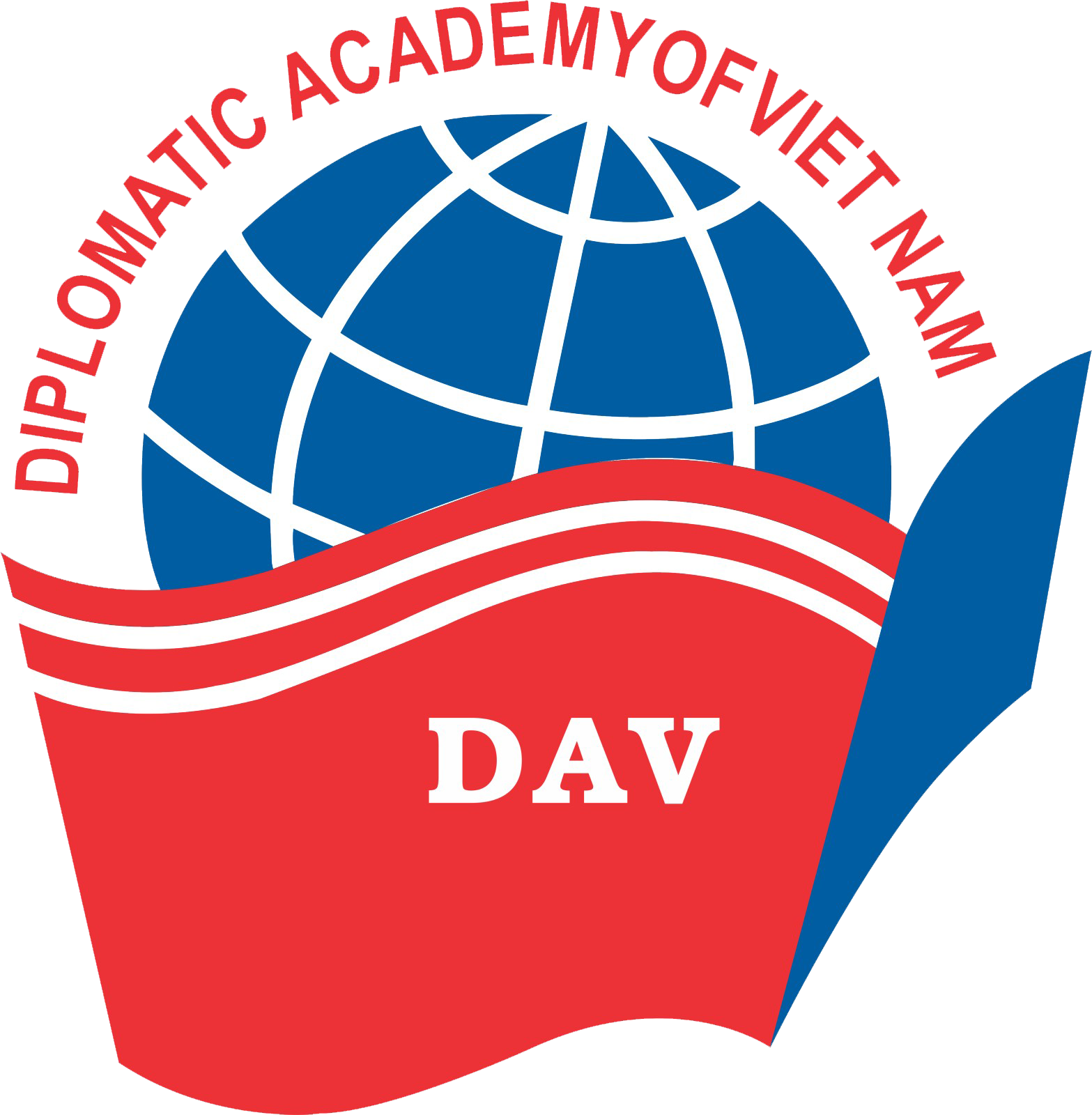
WELCOME REMARKS BY PRESIDENT NGUYEN VU TUNG AT THE 11TH SOUTH CHINA SEA INTERNATIONAL CONFERENCE
(Unofficial full-text translation)
- Dear Mr. Nguyen Van Quyen, Chairman of the Vietnam Lawyers Association
- Dear Mr. Le Hoai Trung, Deputy Minister of Foreign Affairs
- Dear Mr. Pham Gia Khiem, Former Minister of Foreign Affairs of Vietnam
- Honorable speakers and representatives,
- Distinguished guests,
- Ladies and gentlemen,
I am glad to welcome you to the Eleventh South China Sea International Conference on “Cooperation for Regional Peace and Development”, organized by the Diplomatic Academy of Vietnam in cooperation with the Vietnam Lawyers Association and the Foundation for East Sea Studies.
As promised last year, we gather again this year at the Pan Pacific hotel in Hanoi, the capital of Vietnam, to continue our discussion on the South China Sea.
Mr. Nguyen Van Quyen and I are very happy to meet old friends again in this room, those who have actively contributed to the success of previous conferences and also for this one. I also would like to welcome new friends attending this Conference for the first time. Up to now, the conference has attracted many scholars from ASEAN countries, China, Japan, Republic of Korea as well as other countries such as the US and European countries.
Ladies and Gentlemen,
Exactly 10 years ago, the first South China Sea International Conference was held in Hanoi. After 10 years, the International Conference on the South China Sea has achieved many successes. Among those successes, the Conference series have made three most notable contributions to the common knowledge of the international community concerning the South China Sea issues:
Firstly, the Conference has established its reputation as a prestigious and highly expected academic event about the South China Sea. The Conference has gathered leading experts in the region and the world to discuss maritime security, laws of the sea, maritime economic development, and protection of the marine environment. The Diplomatic Academy of Vietnam, the Foundation for East Sea Studies and the Vietnam Lawyers Association are very pleased to invite a large number of prestigious speakers.
Secondly, the Conference has become a rendezvous for people with the same interests, especially interests in the South China Sea. At the Conference, we will meet both familiar and new faces. This means that the Conference has been building the momentum for interests from the international community on maritime security issues in general and the South China Sea in particular as well as creating a connection among the generations of scholars and among related fields.
Thirdly, the Conference has contributed to nuture studies on the South China Sea both inside and outside the region. After 10 years, the Conference has collected 350 conference papers and attracted more than 2,000 participants. From these discussions, hundreds of writings and dozens of books have been published around the world, increasing knowledge and awareness on various aspects of the South China Sea such as history, politics, economy, justice, culture, environment, etc. This contributes to policy-making processes to sustain peace, stability, and further cooperation in the South China Sea and the region. In your document bag, there is a recently published book that is the product of previous Conferences.
Ladies and Gentlemen,
Over the past 10 years, the South China Sea has witnessed many complicated developments in diverse directions. I am of the same mind with the ideas that Mr. Quyen just raised a few minutes ago:
On one hand, there is a growing tendency for negotiations and cooperation. The most notable example is the completion of the first reading of the Single Draft Negotiating Text of the Code of Conduct (COC) between ASEAN and China in July 2019. After conducting the first joint naval exercise ever with China in October 2018, ASEAN held the first joint naval exercise with the US in September 2019, a proof of ASEAN’s increased cooperation to build trust and protect maritime security in the region. Those are positive points.
However, militarization, confrontation, and increased tension still continue. Use of or threats to use of asymmetrical forces to resolve disputes is becoming more popular. The effectiveness of the international law system is being threatened by reckless interpretation and application of international law to serve selfish intention, in the context of growing complex geopolitical competitions worldwide. We have also seen this situation through the discussions of senior leaders in the ASEAN Summit that just ended a few days ago.
It is worth noting that issues in the South China Sea are not constrained to the Southeast Asia region, but they are also related to other maritime areas in the world, such as the East China Sea, the Indian Ocean, the Strait of Hormuz, the South Pacific Ocean, polar areas, etc. The interdependence between seas and oceans are becoming increasingly clearer. Protecting marine environment, combating climate change, sustainable use of natural resources, upholding laws and orders on the sea, and ensuring maritime security for coastal countries and communities are problems that require solutions from the entire international community.
Ladies and Gentlemen,
After such 10 Conferences, we have always contemplated how the International Conference on the South China Sea can improve itself to make better contributions to addressing new difficulties and challenges in this new context from scholars perspective?
With the achievements and experiences gained in the past 10 years, this year we bring the International Conference on the South China Sea back to its place of birth, Hanoi, to mark the beginning of a new chapter with renewed efforts and expectations. The Eleventh International Conference on the South China Sea, therefore, will have several new features as follows:
First, we encourage an expanded view of the South China Sea. Instead of viewing this Sea merely from the angle of territorial, maritime and resource disputes between the coastal states, we should view the South China Sea in a broader angle as the linkage between oceans, where both regional and extra-regional states meet in their interests and willingness to uphold international law, and where states can dialogue and effectively cooperate. This is the South China Sea as viewed in the recently adopted ASEAN Outlook on the Indo-Pacific.
Second, we also acknowledge an inter-connection between land and sea, and between oceans and oceans. As seas and oceans are now viewed as belonging to a single body of water and being the continuation of land, the International Conference on the South China Sea this year will have six concurrent roundtable sessions on maritime cooperation and developments in other maritime areas, including the East China Sea, the Indian Ocean, the Pacific Ocean and the Arctic Oceans.
Third, discussions are tailored to be more practical with greater participation from policy makers and practitioners. Governmental officers will have chances to share their experiences and exchange ideas and initiatives with the academia. In other words, the 11th International Conference on the South China Sea will play a better role in bridging the official (Track I) and semi-official (Track II) tracks to find innovative solutions for peace and cooperation in the South China Sea.
It is special that this year’s Conference is held coincidentally with the 25th anniversary of the entry into force of the United Nations Convention on the Law of the Sea 1982 and of Viet Nam’s accession to this Convention. In this occasion, the Conference has a separate session to review the drafting process and the importance of this “Constitution of the Ocean” after 25 years since it came into force.
This year, the Conference has attracted an unprecedented number of participants with over 250 delegates from over 20 countries have registered. They include officials from embassies and foreign missions in Ha Noi, officials from Viet Nam’s governmental agencies, experts and scholars from research institutions specializing in ocean and sea studies, and a large number of domestic and international press. But the spirit of open, candid, science-based and objective discussion remains unchanged and scholars speaking on behalf of their individual capacities. That has become an attractive brand of our Conferences in the past 10 years and in the future and we will continue to keep this spirit.
Finally, we would like to emphasize that this Conference has received the support of a number of domestic and international sponsors. We would like to sincerely thank the support of the Viet Nam Oil and Gas Group (PVN), the Delegation of the European Union in Viet Nam, the United Kingdom Embassy, the German Embassy, the Asia – New Zealand Foundation, the Australian Embassy, the Canadian Embassy and others. Your companionship and support have been a major driving force for us as organizers, especially for my colleagues at the Diplomatic Academy of Vietnam and Foundation for East Sea Studies, and for the success of this Conference.
Ladies and Gentlemen,
I would like to once again heartily welcome you to the International Conference on the South China Sea and hope that you will have though-provoking and fruitful discussions in the next two days.
I wish you the best of health and the Conference the best of success
Thank you very much for your attention!
Unofficial full text of his speech (in Vietnamese) can be download in here.
